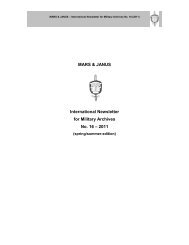National Experiences - British Commission for Military History
National Experiences - British Commission for Military History
National Experiences - British Commission for Military History
Create successful ePaper yourself
Turn your PDF publications into a flip-book with our unique Google optimized e-Paper software.
112 ai r p o w e r in 20 t H Ce n t u ry do C t r i n e s a n d em p l o y m e n t - nat i o n a l ex p e r i e n C e s<br />
built large numbers of Caproni bombers under licence and used them extensively on<br />
the Western Front. The French were interested in Caproni’s designs right from the<br />
first days and obtained a licence when the CA30 was barely off the drawing board.<br />
In the winter of 1917-18, Caproni paid a long visit to Paris; and towards the end of<br />
the war, Caproni also made an extensive tour of the US. Additionally, in the period<br />
1917-18, large French and US air contingents were based in Italy). I am not necessarily<br />
suggesting that any influence that Caproni had on <strong>British</strong> airmen could be<br />
rightly compared to his profound influence on US airmen - which is not to say that<br />
any Caproni influence on <strong>British</strong> airmen can be disregarded.<br />
It is of course possible (though not I think probable) that Caproni did not refer to<br />
Douhet by name in his discussions with <strong>British</strong> airmen. In any case, they would have<br />
been aware of Douhet’s ideas, which is the important point.<br />
After Italy joined the Allied side in WWI, a <strong>British</strong> <strong>Military</strong> Mission was attached<br />
to the Italian Supreme Command (May 1915 to August 1919). The head of the Mission<br />
was Brig.-Gen. Sir Charles Delme-Radcliffe, who had been <strong>British</strong> <strong>Military</strong><br />
Attaché in Rome be<strong>for</strong>e the war. Among the many reports he wrote during the war<br />
was one on Douhet’s court-martial. The <strong>British</strong> Embassy also reported on the courtmartial,<br />
a cause celebre of the day.<br />
The most important of the <strong>British</strong> airmen and soldiers who served in Italy during<br />
WWI was undoubtedly Hoare. Samuel Hoare (Secretary of State <strong>for</strong> Air 1922-4,<br />
1924-9 and 1940) headed the Special Intelligence Section of the <strong>British</strong> <strong>Military</strong><br />
Mission from the early summer of 1917 to the beginning of 1919.<br />
Most of Hoare’s papers <strong>for</strong> the period 1917-19 were closed to public inspection<br />
<strong>for</strong> many years and I have not had an opportunity to study them. However, the<br />
biography of Hoare by JA Cross does provide a good deal of in<strong>for</strong>mation about his<br />
wartime service in Italy. Suffice it to say that such evidence as he produces clearly<br />
shows that, during the years 1917-19, Hoare (in addition to his normal duties) learnt<br />
Italian and immersed himself in Italian society, with the dual aim of: 1. fostering<br />
those elements that backed the war; and 2. countering those elements that were neutralist/<br />
pacifist/defeatist. To this end, Hoare cultivated those politicians, industrialists<br />
and journalists who supported the war and its active prosecution. For example, he<br />
became very friendly with Bissolati and he financed Mussolini.<br />
In light of his activities, I consider it very probable that Hoare came into contact<br />
with Caproni whilst in Italy - and quite possibly with Douhet himself. Final judgement<br />
will however have to await study of Hoare’s papers.<br />
Even if we suppose, despite the evidence presented above, that Hoare did not<br />
learn of Douhet and his ideas whilst serving in Italy, we can be all but certain that he<br />
did learn of Douhet and his ideas in the 20s.<br />
In his memoirs, Hoare testified to the great <strong>British</strong> interest in, and the especially<br />
close ties with, Italian aviation in the 20s. If the primary reason <strong>for</strong> the great interest<br />
was the growing might and reputation of the Italian air <strong>for</strong>ce, the closeness of the ties



